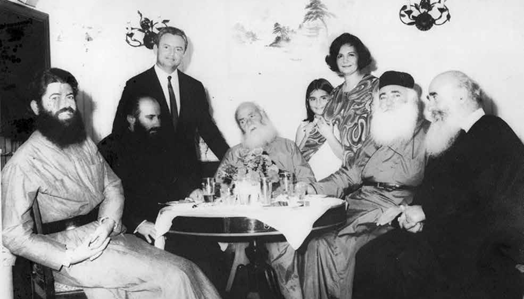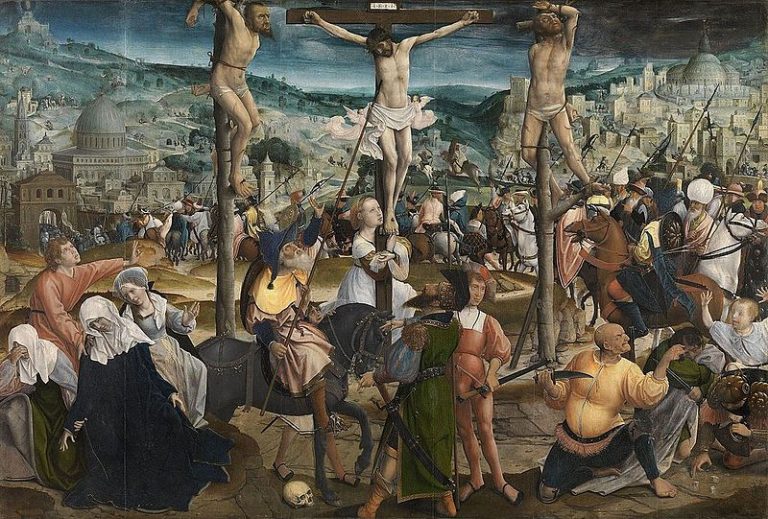Commemoration of the Baptism of Eunuch of Ethiopia by Deacon Philip
The Acts of the Apostles, this inspired book of the New Testament, describes with great clarity the missionary work of the Lord’s disciples and is for us a manual of history and a way of testifying to the testimony of Christ. In the very first chapter of the book the command is given by Jesus: “But receive ye power through the coming of the Holy Ghost upon you, and be ye witnesses unto me in Jerusalem, and in all Judea and Samaria, and unto the uttermost part of the earth” (Acts 1:8-9), which His disciples will then follow with self-sacrifice. So important is the work of spreading the Gospel that, immediately after Judas’ loss, Matthias takes his place (Pt 1:22). Crucial is the role of each of the twelve apostles in the ministry of the Word of God, a fact that is demonstrated along the way, as each disciple of Christ carries out a tremendous missionary work in spite of all the meager means at his disposal.
Mission is not only a human affair, but it was, is and will be God-human. That is why, when the epiphany of the Holy Spirit occurs to the Apostles, preaching immediately begins, accompanied by miraculous signs. Attendees, coming from different countries, hear the teaching clearly in their own language, to the extent that they are educated: “And how we hear every one of us in our own dialect in which we were born, Parthians and Medes and Elamites, and those who dwell in Mesopotamia, Judea and Cappadocia, Pontus and Asia Minor, Phrygia and Pamphylia, Egypt and the Libyan parts of Cyrene, and the Romans, Jews and converts, Cretans and Arabs, do we hear the greatness of God in their daily languages?” (Prax. 2:8-11). God’s Word speaks to the hearts of men, those hearts that were made by Him and rest in Him. It is offered from Peter’s lips and the people, experiencing a superlative inner cosmogony, express themselves with enthusiasm, faith and zeal: “what shall we do, brethren?” (Prax. 2:37). The apostle of Christ immediately exhorts them: “repent, and be baptized every one of you in the name of Jesus Christ for the remission of sins, and receive the gift of the Holy Ghost” (Pt 2:38), and souls respond “as it were three thousand” (Pt 2:41). Thus, by the flame of the Apostles, but especially by the grace of God and the guidance of the Holy Spirit, the time was passing, “and the word of God grew strong, and the number of the disciples in Jerusalem increased greatly, and a great multitude of the Jews were subject to the faith” (Acts 6:7). This lightning spread of the gospel angered the rulers of Jerusalem, resulting in “a great persecution against the church in Jerusalem; and all of them were scattered through the countries of Judea and Samaria” (Tract 8:1). As all the persecuted apostles “dispersed and preached the word by evangelizing” (Tract 8:4), so Philip, one of the seven deacons, “went down to a city of Samaria and preached Christ to them” (Tract. 8:5). Living among the Samaritans, he preached and worked miracles, so that multitudes flocked to him, believing in Christ and being baptized. Even this Simon the Magician, amazed before the power of Philip’s God, was baptized and remained “a worshipper of Philip” (Pr 8:13).
![]()
An instrument of God, Philip – as missionaries must be – received a command from an Angel of the Lord: “Arise, and walk at noon by the way that goeth down from Jerusalem unto Gaza: it is desolate; and the sighing is upon him” (Acts 8:26-27). The immediacy of the communication between the angel and Philip is undeniable and indicates that the deacon was a participant in the divine work, had a heart with sensitive loving senses to hear God’s voice and a being ready to obey and follow Him. Is our heart “listening”? Does it sense God’s promptings? Probably not, because we are not willing to follow Him…
“And, behold, there came up an Ethiopian prince, Candace, a prince of the kingdom of the Ethiopians, who was upon all this gauze, who went on a pilgrimage to Jerusalem, and stood under it, and sat upon its chariot, and lifted up the prophet Isaiah” (Acts 8:27-28). St. Chrysostom comments on the Ethiopian: “Great are the things that have been said of him, though he certainly resided in Ethiopia and was surrounded by so many affairs because of his position, though there was no great feast, though he resided in a superstitious city, yet he came to worship in Jerusalem” (John Chrysostomou, H.P.E., Sermon XI, ed. “Gregory Palamas”, vol. 15, Thessaloniki 1983, p. 539). And it was not enough for him just to worship in the holy place, he did not remain hypocritically only in a sterile external manifestation of his religiosity, but, possessed by a spirit of discipleship, he studied, striving to understand the prophet. This persistent effort had accumulated questions in his mind for which he could turn to no one. “And the Spirit said to Philip, ‘Come, and beware, and cleave to this Lamb.And when Philip heard the prophet Esaias the prophet, he said, “Why dost thou not rejoice and rejoice?” and he said, “How can I, if he lead me not? 8:29-31). “How can I possibly understand, comprehend and experience the inspired texts unless someone guides me?” the prince answers Philip’s question. The same response – and a shouting one at that – is uttered by the Gentiles to the Orthodox Church: “Who will teach us the Gospel, who will catechize us and lead us into the embrace of the Church, into Salvation?” And when they encounter the Messiah through the missionary work, then their immense gratitude is mixed with lamentation: “What took you so long? Where have you been all these years?” Well, if you are not my brother and sister or I to teach Christ, then who is? Is it the heretic, the unbeliever or the atheist? Let there be no mistake. The nations cry out. At least we should not be indifferent…

“Now the region of the scripture which he hath set up is as a sheep to the slaughter, and as a lamb against him that lay dumb, so he openeth not his mouth: in his humiliation his judgment is come: and what shall he tell of his generation? That his life departed from the earth.And the eunuch answered Philip, and said, Thy worship, of whom saith the prophet, Of himself, or of another? and Philip opened his mouth, and denied the scripture, and preached unto him the gospel of Jesus” (Prox. 8:32-35). The purpose of missionary work is to preach “Jesus”. This is exactly what the Apostles did; they preached Christ and the Resurrection. Therefore, we must first of all connect with Christ through the Sacraments, discover Him in the Bible, understand Him by studying the writings of the Church Fathers, and then meet Him by ministering to Him in the person of the resurrected brethren. It is necessary to increase and warm our love for Jesus, not to remain attached exclusively to the care of the poor with a sentimental romanticism that diminishes day by day and year by year, leading us to become bearers of a selfish persona and to become indifferent to our relationship with God. But on the contrary, immersed in the well of Divine Love, we draw the living water and transmit it everywhere. “And as they were on the way, they came upon the water, and the eunuch said, Behold water; what hinders me from being baptized?And Philip said, If thou believest with all thy heart, thou shalt be baptized. And he answered and said, I believe in the Son of God, that is, in Jesus Christ.And the chariot was released, and they both went down to the water, Philip and the eunuch, and baptized him” (Acts 8:38). cry with Ethiope and the Gentiles, brothers and sisters unbaptized throughout the world, where the Truth of Christ is ignored. What prevents you…
It hinders you that I do not have a heart burning with love like Philip’s… It hinders you that I do not have feet like his to run to you, that I do not place myself at God’s disposal… It hinders you that I do not understand Jesus who urges me to go towards you… It hinders you that many times I understand Him, but unfortunately I do not have the courage to obey Him… The obstacle is my indifference, the indifference of an orthodox baptized Christian from birth with a lukewarm life in Christ. Obstacle my false example, the mask of hypocrisy I wear, my inability to love Christ as he loved me and sacrifice for you. A disadvantage is my lack of faith and my inability to communicate it to you, so that you, like the Ethiopian, may confess it: “I believe the Son of God is Jesus Christ.” The memory of the baptism of the Ethiopian by Deacon Philip is commemorated on August 26 of each year.




